
Dr. Howard Neufeld, an Honors College faculty member and a professor in the Department of Biology at Appalachian State University, is one of two recipients of the Office of Student Research’s 2020 Undergraduate Research Mentorship Excellence Award. Neufeld is pictured at Grandfather Mountain near Boone with a pressure chamber used to measure the water status of a tree. Photo submitted
BOONE, N.C. — Dr. Howard Neufeld, professor in the Department of Biology and a longtime faculty member in the Honors College, and Dr. Megen Culpepper, assistant professor in the A.R. Smith Department of Chemistry and Fermentation Sciences, are recipients of the 2020 Undergraduate Research Mentorship Excellence Award, conferred by Appalachian State University's Office of Student Research.
Neufeld has over 20 years of experience mentoring students in research, and Culpepper has mentored 21 students since her arrival at Appalachian in 2014, including Honors College students writing honors theses. Below, both College of Arts and Sciences professors offer advice for faculty mentors and recount their experiences.

Dr. Howard Neufeld, an Honors College faculty member and a professor in the Department of Biology at Appalachian State University, is one of two recipients of the Office of Student Research’s 2020 Undergraduate Research Mentorship Excellence Award. Neufeld is pictured at Grandfather Mountain near Boone with a pressure chamber used to measure the water status of a tree. Photo submitted
Neufeld advises patience and encouragement
About the rewards of mentoring, Neufeld said, “To watch an undergraduate go from being naive about science and inexperienced in working with sophisticated scientific instruments, to being technically competent, aware of the literature and savvy about how to do science, is one of the greatest thrills of being their mentor.”
He recounted one experience with honors student and Chancellor’s Scholar Rachel Jordan ’18, who is now earning her Ph.D. at the University of Wisconsin–Madison.
“Rachel came to me looking for some guidance after a rough freshmen year, and I recognized right away just how bright and enthusiastic she was,” he said. “After getting her feet wet working on a variety of projects in the lab, we settled on investigating whether red spruce and Fraser fir trees could take advantage of warm periods in the dead of winter to do photosynthesis, and to gain some carbon at a time of the year when most people think these trees are dormant.”
This climate-related research, conducted by Jordan with Neufeld in wet and cold weather on Grandfather Mountain, helped inform the Christmas tree industry in North Carolina and was presented at several professional conferences. Jordan was awarded a National Science Foundation (NSF) Graduate Research Fellowship, which provides five years of full financial support toward her doctorate.
Neufeld said patience and encouragement were key to an effective mentorship. He advises other faculty to “be patient at first as students make mistakes, but encourage them and show them that they are not alone when they do make mistakes.”
In his nomination form recommending Neufeld for the award, one of Neufeld’s undergraduate student mentees said Neufeld encourages hands-on research — making it exciting and fun — and, while encouraging students to challenge themselves, also respects the limitations and obstacles a student might encounter.
Culpepper applauds ‘perseverance and internal push’
“Mentoring students is hands-down the best part of my job,” Culpepper said. “Students at this level of training are eager to learn and do an amazing job becoming scientists.”
She said the reward comes in seeing her students recognized for their hard work, and she recounted the following story about a student working with her on a National Institutes of Health (NIH) grant:
“He was so bright and a first-generation college student like me. Graduate school hadn’t worked out for him,” she said. Culpepper was helping the student explore job opportunities, one of which was a position testing cockroaches for specific diseases.
“I remember looking at him over my desk and seeing the despair on his face that this was going to be his job after four years of very hard work,” she said. Culpepper encouraged him to push through and, “one week later he was awarded an NIH postbaccalaureate fellowship. He recently began graduate school at Yale in biochemistry. What a story of perseverance and internal push!” she said.
Culpepper advises young faculty choosing to mentor to “make yourselves vulnerable to your mentees. I have told countless stories of my own failures and successes. They see me struggle to keep it all together; they see my highs and lows, just like I see theirs. We are a team,” she said.
Scott Hammers ’20, a mentee of Culpepper’s and a graduate of Appalachian’s B.S. in chemistry–biochemistry program from Raleigh, said, “Culpepper strives to make sure everything is learned correctly and then pushes you to always do better. She helped give me insight and advice about graduate schools and the application process. She taught me laboratory techniques and the science behind them, which has in turn made my classes that much easier.”
What do you think?
Share your feedback on this story.
About student research at Appalachian
Appalachian State University encourages faculty-mentored student research, which provides students with the opportunity to work side by side with faculty on meaningful research or creative endeavors. These projects often result in presentations, performances or exhibitions at regional, national and international conferences and events. Students who engage in research are able to apply knowledge from the classroom into real-world experiences and learn how to problem-solve, effectively communicate and analyze complex issues. Appalachian’s Office of Student Research (OSR) was established in 2005 to expand the opportunities necessary for undergraduate and graduate students to engage in research and creative activities at Appalachian. Learn more at https://osr.appstate.edu.
About the College of Arts and Sciences
The College of Arts and Sciences (CAS) at Appalachian State University is home to 17 academic departments, two centers and one residential college. These units span the humanities and the social, mathematical and natural sciences. CAS aims to develop a distinctive identity built upon our university's strengths, traditions and locations. The college’s values lie not only in service to the university and local community, but through inspiring, training, educating and sustaining the development of its students as global citizens. More than 6,800 student majors are enrolled in the college. As the college is also largely responsible for implementing App State’s general education curriculum, it is heavily involved in the education of all students at the university, including those pursuing majors in other colleges. Learn more at https://cas.appstate.edu.
About Appalachian State University
As a premier public institution, Appalachian State University prepares students to lead purposeful lives. App State is one of 17 campuses in the University of North Carolina System, with a national reputation for innovative teaching and opening access to a high-quality, cost-effective education. The university enrolls more than 21,000 students, has a low student-to-faculty ratio and offers more than 150 undergraduate and 80 graduate majors at its Boone and Hickory campuses and through App State Online. Learn more at https://www.appstate.edu.





![How NCInnovation Is Rethinking Economic Development in North Carolina [faculty featured]](/_images/_posts/2026/02/rethinking-economic-development-600x400.jpg)








